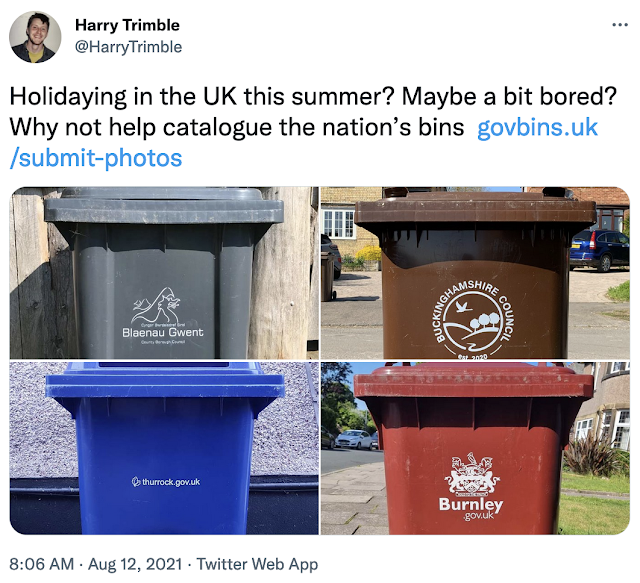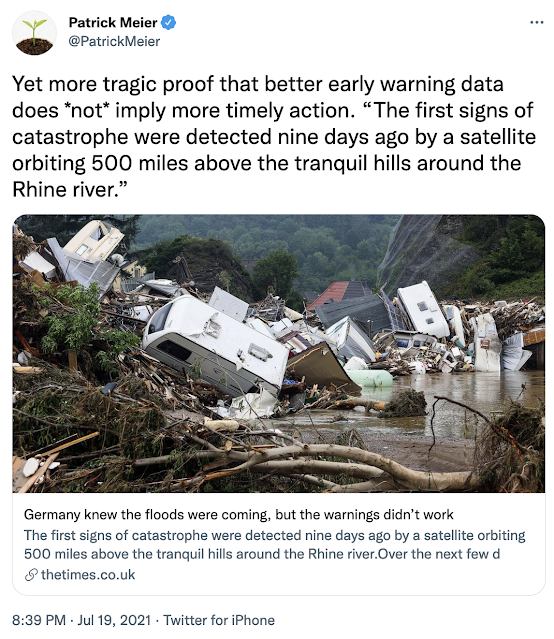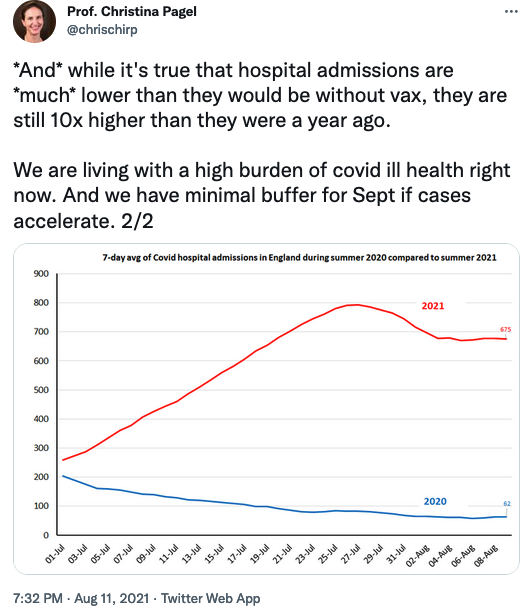Summer-notes: maps and data and pandemic bits
OpenStreetMap is considering moving out of the UK. Yes, it's an international project. But the actual legal bit which processes money and holds assets etc is in the UK. Database rights changes with Brexit, and administrative challenges, plus the loss of EU lobbying power, are all driving a possible change. It's hard to be a modestly sized global non-profit these days - even modest levels of paperwork such as we have in the UK are a heavy load, and on the finance side are especially tricky for rotating volunteer boards from around the world.
There's a quest-based Android app where you can improve OpenStreetMap data in your area! Makes it much easier to find places where the data could be better, and fix things up - StreetComplete. Or you can help map areas elsewhere to support humanitarian relief work with the MapSwipe app.
But there's still no national open data for rights of way in the UK. This might explain why people don't use them so much - although the OrdnanceSurvey maps app is great and fairly reasonably priced.
 |
| https://twitter.com/HarryTrimble/status/1425715379649794053 |
There's a lot of excitement about using data to predict things. But we don't always use the predictions we have:
 |
| https://twitter.com/PatrickMeier/status/1417207574991196160 |
A new form of Luddism is proposed by Jathan Sadowski -
Today, new technologies are being used to alter our lives, societies and working conditions no less profoundly than mechanical looms were used to transform those of the original Luddites. The excesses of big tech companies - Amazon’s inhumane exploitation of workers in warehouses driven by automation and machine vision, Uber’s gig-economy lobbying and disregard for labour law, Facebook’s unchecked extraction of unprecedented amounts of user data - are driving a public backlash that may contain the seeds of a neo-Luddite movement.
As Gavin Mueller writes in his new book on Luddism, our goal in taking up the Luddite banner should be “to study and learn from the history of past struggles, to recover the voices from past movements so that they might inform current ones”.
What would Luddism look like today? It won’t necessarily (or only) be a movement that takes up hammers against smart fridges, data servers and e-commerce warehouses. Instead, it would treat technology as a political and economic phenomenon that deserves to be critically scrutinised and democratically governed, rather than a grab bag of neat apps and gadgets.
Peter seems to agree -
 |
| https://twitter.com/peterkwells/status/1425053820770455557/photo/1 |
Roblox is big, although I'm not sure whether to class it as a platform or a game or a game development environment or something else; and it seems like bits of it should be fun. But it's also worrying:
Policy reports often seem to disappear - so it's great to see that PolicyCommons is collecting them!
 |
| https://twitter.com/TobyABGreen/status/1411210105983537157 |
In other positive news, important court and tribunal judgements will now be available online via the National Archives! Campaigning for this was underway even back when I was at Open Knowledge, so it's probably been a decade or more in the works...
Nice to see the National Risk Register being quoted in this Telegraph piece - especially the likelihood vs impact diagram with the risk icons. It doesn't include declining rule of law, which is the basis of this FT article noting that aside from the general badness of this, it also reduces international confidence and trade.
SARS-CoV-2 is airborne, and that means useful infection prevention measures are different from other respiratory pathogens. A review paper in Science:
Traditionally, it was thought that respiratory pathogens spread between people through large droplets produced in coughs and through contact with contaminated surfaces (fomites). However, several respiratory pathogens are known to spread through small respiratory aerosols, which can float and travel in air flows, infecting people who inhale them at short and long distances from the infected person. Wang et al. review recent advances in understanding airborne transmission gained from studying the spread of severe acute respiratory syndrome coronavirus 2 (SARS-CoV-2) infections and other respiratory pathogens. The authors suggest that airborne transmission may be the dominant form of transmission for several respiratory pathogens, including SARS-CoV-2, and that further understanding of the mechanisms underlying infection from the airborne route will better inform mitigation measures.On Stratechery [paywall] there's an interview with Zeynep Tufecki, one of the authors of that paper, who expresses surprise that it's still worth reading scholarly papers etc at this stage in the pandemic, because the public health authorities somehow aren't providing useful clear information. It was one thing to have confusion in March 2020, but we still don't have a well ordered institutional response now, focussed on what we know (for instance, that ventilation matters for airborne diseases). There's no high quality, easy to access information, and many topics are highly polarised and debated.
Some places are more active in working on ventilation as a critical mitigation:
 |
| https://twitter.com/jljcolorado/status/1412498670189256706 |
It's not like we don't know what works. SAGE presented the government with a paper on mitigation measures in April - published in July. Russ Garrett summarises the key results as things stood in April, so, testing and isolation, potential effectiveness high, current effectiveness low-medium. Stay home when sick, potential effectiveness high, current effectiveness low. And of course perspex screens, potential effectiveness low.
The National Audit Office's second report on Test&Trace came out (yes, ages ago, what of it). There is some good news - we've done well with doing genomic sequencing and sharing the results. Otherwise, only 14% of the lateral flow tests sent out have been registered as used, tracing contacts has been pretty slow, despite changing the definition of what was counted, and there's still a lot of expensive consultants involved. Summary thread.
 |
| https://twitter.com/uk_domain_names/status/1421352963315011588 HT Dan Lockton |
I found it astonishing that in mid-August, things were so much worse than they were at the same time a year before and yet hardly anyone seemed to notice. Cases 25 times higher, and perhaps 'that doesn't matter' because of vaccination, but also hospital admissions 10 times higher.
 |
| https://twitter.com/chrischirp/status/1425525453855600641 |
It turns out that hundreds of projects to create AI tools to diagnose, or help identify treatments, for Covid-19, delivered exactly no useful tools for clinical use.
Another technology which was much discussed seems to be fading away, between frustration with alerts and lack of adaptation to new circumstances - Ian Brown writes a 'sad postscript' on contact tracing apps in the UK.
Hopefully I'm through the summer notes backlog now :)